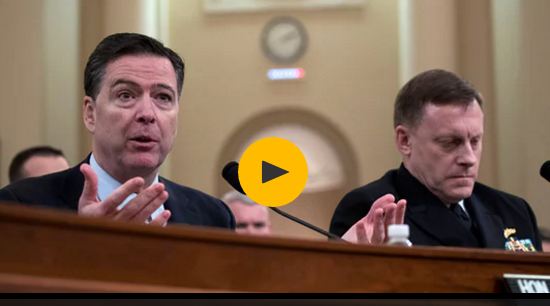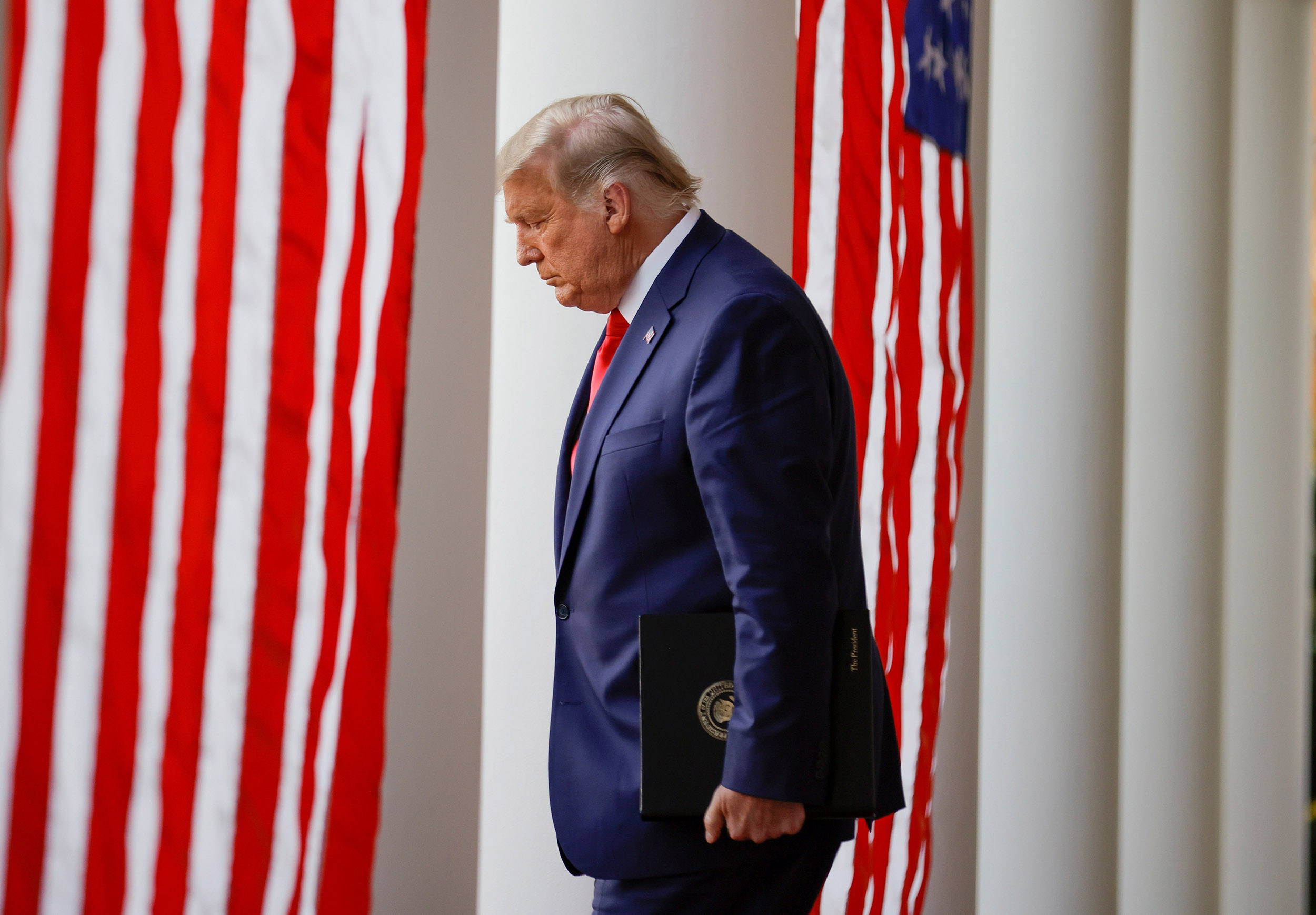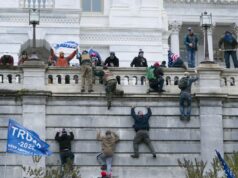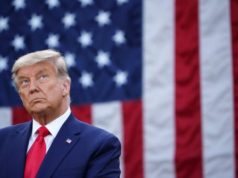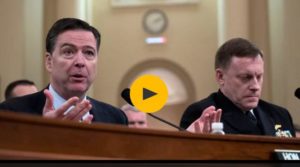 FBI director James Comey has said there was no basis for Donald Trump’s claims to have been wiretapped by Barack Obama, but confirmed for the first time that the agency is investigating possible collusion between the Trump campaign and Moscow to influence the outcome of the presidential election.
FBI director James Comey has said there was no basis for Donald Trump’s claims to have been wiretapped by Barack Obama, but confirmed for the first time that the agency is investigating possible collusion between the Trump campaign and Moscow to influence the outcome of the presidential election.
Comey had previously refused to comment on the existence of any such investigation but addressing the House intelligence committee, Comey reversed course and said he had been authorised to depart from that policy and give some basic details.
Comey’s appearance, flanked by the NSA director, Adm Michael Rogers, marked a remarkable and unprecedented threshold in US political history, putting beyond doubt that a sitting’s president’s entourage was under investigation for possibly conniving with a foreign adversary to put that president in power.
What made the moment even more extraordinary was Trump’s tweeted commentary on – and misrepresenting of – the hearing as it was happening.
Comey and Rogers refused to answer scores of questions speculating on who in Trump’s orbit could be part of the wide-ranging investigation and spurned countless invitations to comment on news reports. But they made many key points over the course of several extraordinary hours of testimony.
- The counter-intelligence investigation into Trump-Moscow links began in late July 2016 and is still ongoing
- More than one person associated with the Trump campaign is under investigation for their ties to the Russian government
- Both FBI and NSA directors said there was no information to support Trump’s claims that he had been wiretapped by the Obama administration
- The NSA chief rejected White House suggestions that GCHQ had helped the Obama administration spy on Trump Tower and said the claim was “frustrating to a key ally”
- The Russian intervention in the election was “unusually loud”, as if Moscow did not care about being caught
Comey repeatedly stressed the unusual nature of the occasion, which led him to break with longstanding FBI practice of never commenting on ongoing investigations.
“I have been authorised by the Department of Justice to confirm that the FBI, as part of our counterintelligence mission, is investigating the Russian government’s efforts to interfere in the 2016 presidential election,” Comey said.
He added: “And that includes investigating the nature of any links between individuals associated with the Trump campaign and the Russian government and whether there was any coordination between the campaign and Russia.”
Comey said that the investigation included the possibility that criminal acts had been committed. He declined several invitations to agree with a statement made earlier this month by the former director of national security James Clapper that no evidence had emerged during the Obama administration pointing to collusion between the Trump campaign and Moscow.
“I cannot say more about what we are doing and whose conduct we are examining,” Comey said, adding that he would provide more details to the committee behind closed doors.
Comey and Rogers were asked for their assessment of allegations Trump has made over the past 16 days that he and his campaign had been wiretapped by the Obama administration.
“I have no information that supports those tweets, and we have looked carefully inside; the DoJ has asked me to share with you that the answer is the same for the DoJ in all its components,” Comey said.
As for the president’s claim that he was a victim of McCarthyism, the FBI director said: “I try very hard not to engage in any -isms of any kind, including McCarthyism.”
Rogers said that the NSA also had no information about any such surveillance, and said it was illegal for the NSA to ask its British counterpart, GCHQ, to carry out that spying on its behalf.
The White House spokesman, Sean Spicer, caused consternation in the GCHQ and in Downing Street last week by reading aloud a claim by a Fox television commentator that GCHQ had carried out surveillance of the Trump campaign for the Obama administration. Rogers said he agreed with the rejection of the claim and said it “frustrates a key ally”.
As the hearing unfolded, Trump’s official @POTUS accounts sent out more tweets, giving live commentary with embedded clips of the proceedings.
One of the tweets claimed:
The NSA and FBI tell Congress that Russia did not influence electoral process. pic.twitter.com/d9HqkxYBt5
— President Trump 45 Archived (@POTUS45) March 20, 2017
The tweet made its way to the committee, with the result that Comey and Rogers were confronted with it. Again they said there was no basis for the assertion.
“We’ve offered no opinion, have no view … on potential impact, because it’s not something that we’ve looked at,” Comey said. “It certainly wasn’t our intention to say that today because we don’t have any information on that subject. And it wasn’t something that was looked at.”
The FBI director said it became clear early on in the investigation that it was Vladimir Putin’s intention to help the Trump campaign with Russian intervention, because of the strength of his hatred for Hillary Clinton.
Comey confirmed that the FBI began the counterintelligence investigation in late July 2016, remarking that for such an inquiry, that was “a relatively short period of time”. He said it was “impossible to say” when it would end. He noted it was not referred to in an intelligence community assessment of the Russian intervention presented to Obama and Trump in late December.
Democratic members of the committee asked Comey about a list of Trump’s former or current aides, including the former national security advisor, Michael Flynn; his former campaign manager Paul Manafort; foreign policy adviser Carter Page; another former adviser, Roger Stone; and former media adviser Michael Caputo. The FBI director was also asked about Trump himself. In each case, he said he could neither confirm or deny whether they were under investigation.
Aware of Democratic criticisms, Comey urged Congress and the public not to draw comparisons between his extensive public comments on the Clinton inquiry, arguing that they concerned “details of a completed investigation”, although in the days before the election Comey publicly stated newly inquired information from an ongoing inquiry might affect the Clinton investigation – something that ultimately did not happen.
In his testimony, Comey remarked on the bluntness of the Russian intelligence intervention in the election, which he described as “unusually loud”, as if the Russians did not care if they were caught, or even wanted to be caught. The aim, he suggested was “freaking people out that the Russians might have been undermining our elections successfully”.
Splits between the Republican and Democratic membership were evident from the very start of the hearing. Chairman Devin Nunes, a Republican and a member of Trump’s transition team, sought to put the emphasis on leaks from the intelligence agencies about the investigation, and particularly in the contacts between the former national security adviser Michael Flynn and the Russian ambassador to Washington.
The ranking Democrat on the committee, Adam Schiff, used his 15-minute opening statement to outline a prosecutorial case laying out all the known or reported contacts between members of the Trump campaign team and Russian officials, most of which had been denied by the Trump camp.
“Is it possible that all of these events and reports are completely unrelated, and nothing more than an entirely unhappy coincidence?” Schiff asked. “Yes, it is possible. But it is also possible, maybe more than possible, that they are not coincidental, not disconnected and not unrelated, and that the Russians used the same techniques to corrupt US persons that they have employed in Europe and elsewhere. We simply don’t know, not yet, and we owe it to the country to find out.”
If Trump or his people cooperated with Russia’s so-called “active measures”, Schiff said, “It would represent one of the most shocking betrayals of democracy in history … The stakes are nothing less than the future of our democracy, and of liberal democracy.”
They agreed on one topic: calling Trump’s accusation that Obama had Trump Tower surveilled baseless. Schiff said there is “no evidence whatsoever to support that slanderous accusation”, and Nunes – who suggested other “improper” surveillance on Trump may have occured – said: “We know there was not a physical wiretap of Trump Tower.”
Courtesy: THE GUARDIAN

